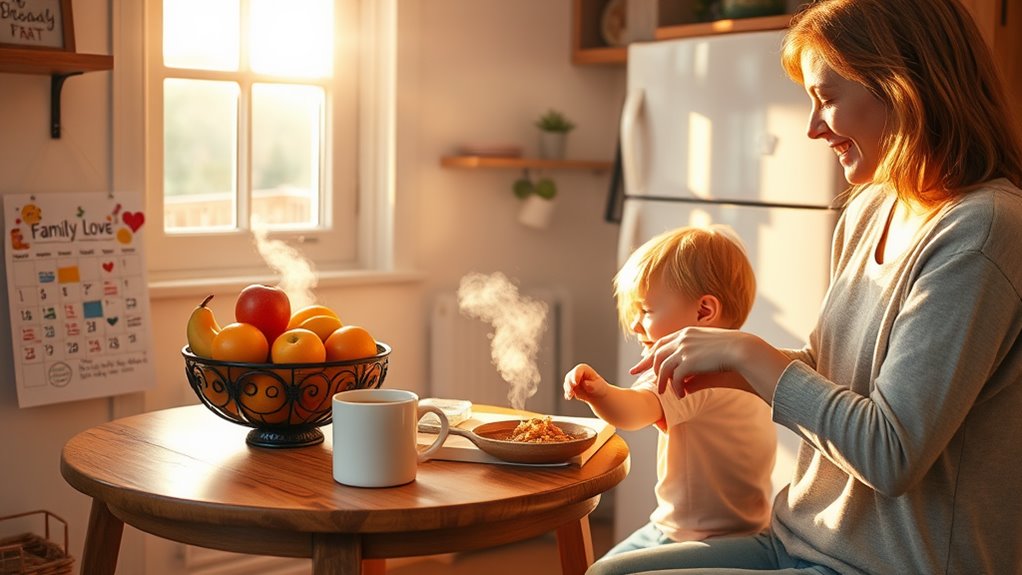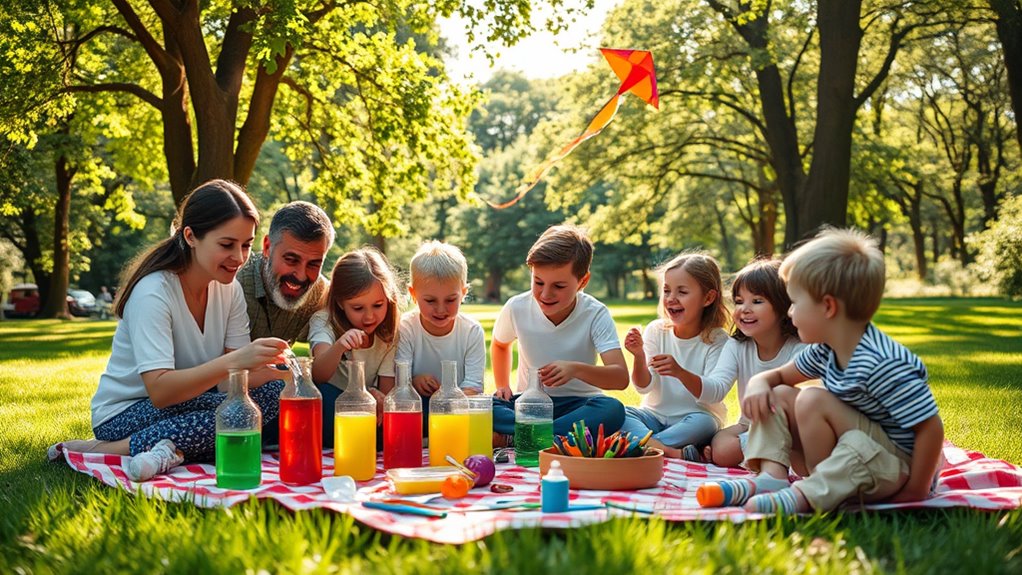How to Create Family Rituals That Bring Everyone Together
Creating family rituals can strengthen your connections and create cherished memories. Start by identifying your family’s core values and brainstorming activities that reflect those beliefs. Encourage everyone to share ideas, like movie nights or cooking together, ensuring everyone feels included. Set a regular schedule to build anticipation, like a weekly game night. Don’t forget to periodically reflect on the rituals to keep them meaningful. Gather feedback from family members to adjust as needed, ensuring everyone stays engaged. By doing this, you’ll set the foundation for lasting traditions that everyone loves. You’ll soon find more tips to enrich these rituals!
Key Takeaways
- Identify and discuss your family values to create rituals that reflect your core beliefs and foster a sense of belonging.
- Brainstorm activity ideas together, encouraging creativity and inclusivity by allowing everyone to share their suggestions without judgment.
- Establish a regular schedule for family rituals to create stability and excitement, making it easier to prioritize time together.
- Regularly reflect on and gather feedback about your rituals to ensure they remain meaningful and enjoyable for all family members.
- Be flexible and open to adjusting rituals seasonally or experimenting with new ideas to keep the family connected and engaged.
Understanding Family Rituals
Understanding family rituals can deepen your connection with loved ones and create lasting memories. These rituals often hold cultural significance, reflecting the values and traditions passed down through generations. When you engage in these shared practices, it reinforces a sense of belonging and identity within your family unit.
Think about the moments that bring your family together—holiday celebrations, weekly game nights, or even simple Sunday dinners. Each of these rituals serves as a foundation for emotional bonding. They provide a space where you can express feelings, share experiences, and create a supportive environment.
The consistency of these rituals fosters trust and strengthens relationships, allowing everyone to feel valued and understood.
Furthermore, rituals can act as a source of comfort during challenging times. They remind you of the support system you have in your family, creating a sense of stability and continuity.
By understanding the importance of family rituals, you can intentionally incorporate them into your life, enhancing your connections and cultivating cherished memories.
Identifying Family Values
Identifying family values is essential for creating a strong foundation in your home. These values reflect your core beliefs and guide the way your family interacts with one another and the world around you.
Start by sitting down with your family and discussing what’s truly important to each of you. Make it a safe space where everyone can express their thoughts without judgment.
Consider what shared interests you have as a family. Think about the activities you enjoy together, the causes you support, and the traditions you cherish. These can give you insight into your collective values. You might discover that kindness, respect, or adventure are at the heart of your family’s identity.
As you identify these values, write them down and display them prominently in your home. This serves as a constant reminder of what you stand for as a family.
The clearer you’re about your values, the easier it’ll be to create rituals that reflect them. Ultimately, these rituals will help strengthen your bond and foster a sense of belonging, making your family life richer and more fulfilling.
Brainstorming Activities Together
Creating family rituals can be a fun and engaging process when you brainstorm activities together. Start by gathering everyone in a comfortable space where everyone can share their thoughts freely.
Encourage creative brainstorming by asking open-ended questions like, “What’s something we’d all enjoy doing together?” or “How can we make our weekends special?” This invites everyone to contribute their ideas.
Consider various activity ideas, such as themed movie nights, outdoor adventures, or cooking challenges. To keep the momentum going, write down all suggestions without judgment.
Once you’ve built a list, discuss each idea and see which ones resonate most with your family.
Don’t forget to include everyone’s interests and preferences, as this fosters a sense of ownership and excitement. If you notice that some ideas spark more enthusiasm, focus on those.
You might even find inspiration from each other’s suggestions, leading to unexpected combinations that everyone will love.
Setting a Regular Schedule
Establishing a regular schedule for family rituals brings a sense of stability and anticipation to your weekly routine.
It’s essential for creating consistency and ensuring everyone knows when to participate. When you set specific days or times for your family activities, you help everyone prioritize these moments together.
Here are three tips for establishing routines that work for your family:
-
Choose a Consistent Day: Decide on a day each week that works best for everyone. This could be a Friday movie night or a Sunday brunch. Consistency helps build excitement.
-
Set a Time: Establish a regular time for your rituals. Whether it’s 6 PM for dinner or 3 PM for game time, having a set hour makes it easier to plan around.
-
Communicate: Keep everyone in the loop about the schedule. Use a shared calendar or group chat to remind everyone of your family rituals.
Encouraging Participation From Everyone
While it’s important to have regular family rituals, encouraging everyone to participate can sometimes be a challenge. To foster a sense of belonging, consider using inclusivity strategies that make each family member feel valued.
Start by discussing potential activities together, allowing everyone to voice their preferences. This not only generates excitement but also gives everyone a stake in the ritual.
Additionally, think about implementing participation incentives. These can be simple rewards for attending or contributing to the rituals, like choosing the next activity or enjoying a favorite treat afterwards. When family members know they’ll have a say in what happens next, they’re more likely to engage actively.
It’s also essential to recognize and celebrate each person’s contributions, no matter how small. Acknowledging efforts can motivate others to join in and feel appreciated.
Lastly, be flexible and open to change. If a ritual isn’t resonating with everyone, don’t hesitate to adapt it. Emphasizing participation through inclusivity strategies and incentives creates a welcoming environment where everyone feels connected, making family rituals a cherished time for all.
Reflecting and Adjusting Rituals
Regularly reflecting on and adjusting family rituals is crucial for keeping them meaningful and enjoyable. As time passes, your family’s needs and preferences may change, making it essential to adapt your rituals accordingly.
Taking time for ritual reflections allows you to evaluate what works and what doesn’t.
Here are three steps to help you adjust your family rituals:
-
Gather Feedback: Encourage each family member to share their thoughts on current rituals. What do they enjoy? What would they change? Listening to everyone fosters a sense of belonging.
-
Consider Seasonal Adjustments*: As seasons change, your family’s schedule might shift too. *Adapt rituals to fit these changes. For instance, a summer picnic could be transitioned into a cozy movie night during winter.
-
Be Flexible: Don’t be afraid to experiment. If a new idea arises, give it a try! It’s okay if not every ritual becomes a favorite; the goal is to create opportunities for connection.
Frequently Asked Questions
What Types of Rituals Work Best for Different Age Groups?
When it comes to rituals, think of playful traditions that suit each age group. Younger ones love fun games, while teens appreciate deeper conversations. All of it fosters meaningful connections, making family time truly special.
How Can I Involve Shy Family Members in Rituals?
To involve shy family members, offer gentle encouragement and create a supportive environment. Start with smaller activities, allowing them to participate at their own pace, helping them feel more comfortable and connected to the group.
What if Family Members Disagree on Ritual Activities?
When family members can’t see eye to eye, it’s like navigating a ship through choppy waters. Try employing some compromise techniques and disagreement resolution strategies to find common ground that everyone can enjoy together.
How Do I Handle Missed Ritual Days or Events?
When you handle missed ritual days, focus on the missed opportunities for connection. Consider alternative plans to celebrate together later, ensuring everyone feels included and valued, helping to strengthen your family bonds despite the setbacks.
Can Family Rituals Be Adapted for Long-Distance Relationships?
Absolutely, family rituals can be adapted for long-distance relationships! You can use virtual gatherings to create shared experiences, like video calls or online games, ensuring everyone feels connected, no matter the distance.





